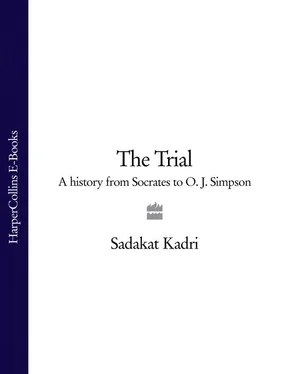1 ...6 7 8 10 11 12 ...34 The story was written almost three centuries after the island’s conversion to Christianity in AD 1000, but it depicts a land rumbling to rhythms far older: a volcanic place of trolls and sprites, where the earth would more likely shrug its shoulders than a man would turn the other cheek. Feuds erupt and cool throughout the fifty years spanned by the work, but the narrative hinges at a point when men loyal to a chieftain called Flosi burn the eponymous Njal to death in his farmhouse. Njal and his wife steadfastly await the flames from the discomfort of their bed and his immediate family chooses to perish alongside him, but one relative determines to escape. Nephew Kari Solmundarson clambers to the rafters and, treading timbers that are sweating smoke, reaches the edge of the building. Seconds after he leaps from the roof, his hair and clothes ablaze, it crashes to the ground. After dousing his sorrows in a nearby stream, he embarks on the mission that will make his name a byword for good fortune throughout Iceland. In agony though he is, disfigured though he is, and bereaved though he is, Kari is also very, very lucky. He has survived to seek revenge.
Outrage mounts as he moves from kinsman to kinsman with news of Flosi’s crime. Thorhall Asgrimsson, a foster son to Njal, is so apoplectic that blood spurts from his ears and he collapses to the ground – a moment of weakness for which he expresses great shame – but he will prove a stalwart ally. For Thorhall Asgrimsson possesses a quality that is hardly less magical than good luck: knowledge of the law. And Njal’s friends and kinsmen agree that it is time to exact an awful revenge. They will take the killers to court.
On being given notice of suit, Flosi ponders whether to settle the case, but is persuaded by a fellow arsonist that, having shown such defiance, it would not be proper to back down. He decides instead to engage a lawyer. After ruling out one candidate, a warrior’s kinsman, on the basis that whoever takes the job is likely to die, Flosi approaches Eyjolf Bolverksson, one of Iceland’s most formidable pleaders. Eyjolf, resplendent in scarlet cloak, gold headband, and silver axe, initially refuses to have anything to do with the case. He is no cats-paw, he declares, ready to meddle in a dispute that has nothing to do with him. Flosi, confronted with a lawyer who speaks of integrity, knows just what to do. He dangles a chunky gold chain from his arm, and Eyjolf rapidly reconsiders. ‘It is only proper for me to accept this bracelet in the face of such courtesy,’ he purrs. ‘And you can fairly expect that I shall take over the defence and do everything that may be required.’ It was a bad move. Icelanders, like virtually every people before and since, had contempt for anyone so dishonourable as to require money to plead for someone’s rights. Eyjolf’s fictional fate was sealed.
The trial takes place on one of Iceland’s endless summer days at the Law Rock, a lava cliff overlooking a large valley and a silver river snaking far below. From across the island, jurors, chieftains, and onlookers converge around the booths that contain the legal teams. All the lawyers are, as is traditional, armed to the teeth and in full battle regalia. On the Rock itself stands Skapti Thoroddsson, the omniscient Law Speaker, who bears the awesome responsibility of memorizing the law and publicly reciting a third of its provisions every year. Kari’s nine jurors are sat on the riverbank, their job not to assess evidence but to swear that procedural steps have been performed correctly. A hush descends, and lawyer Mord Valgardsson steps up to the Rock. In words that echo around the valley, he swears that he will plead according to truth, fairness and law. He calls witnesses to testify that he has been duly appointed and has given the defendants notice of the action. He declares that he has brought nine sworn men to the Law Rock. And do the defendants, he demands, have any objections?
All those watching agree that the performance is a confident one – but Eyjolf Bolverksson, sporting his scarlet cloak and silver axe, then delivers a response that threatens to cripple Mord. Two of the jurors, he contends, should be disqualified because they are related to him. The lawyer, previously so eloquent, is reduced to silence. Consternation spreads across the Rock. The prosecution has barely begun, but seems already to be in ruins.
Only one man can save the day. Thorhall Asgrimsson, bedridden by a monstrous leg inflammation, has been left at home – so upset not to be present that he had waved off his kinsmen with a face as red as beetroot and tears tumbling like hailstones – but his moment of glory has come. Messengers run to the great jurist’s cot with news of the crisis and Thorhall, amused at Bolverksson’s audacity, explains what to do. The advice is relayed to Mord, who swiftly resumes his place. The fact that two of the jurors are his kinsmen does not disqualify them, he retorts. Only kinship with the accuser himself would have that effect. It is, by general consensus, a brilliant rejoinder. Thorhall Asgrimsson, from his sickbed, has saved the day.
A chastened Eyjolf admits that he had not anticipated so unerring a counterstroke, but promptly pulls another arrow from his quiver. Two of the jurors, he declares, are ineligible to swear because they do not own a house. As the jurors rise uncertainly, another wave of anticipation ripples through the spectators. The challenge sounds even more excellent than the first – but the messengers who relay it to Thorhall soon return with more advice. Mord strides to the riverbank, his confidence returning like the tide, and invites both men to resume their seats. The objection is nonsense, he booms. A juror need not own a house. It is enough if he possesses a milk cow. Amidst tumultuous excitement, the point is once again referred for adjudication to Skapti Thoroddsson. The crowds wait in an atmosphere so tense it could be split with a battleaxe, until the Law Speaker emerges from his booth to announce his ruling. The prosecution is right. It is enough to own a milk cow.
Eyjolf finally lets fly with a plea that many think the most powerful of all. Four of the jurors must stand down, he contends, because there are other men who live closer to the scene of the crime. The point is, Thorhall accepts, a superb one. But not so superb as to be unanswerable. Told what to say, Mord steps forward once again. The four jurors are indeed disqualified, he concedes – but a majority verdict will suffice, and five of the original nine jurors remain. For long minutes, the Law Speaker silently ponders the claim. And then he rules. The point is good – so good, indeed, that he is astonished. Until that moment, he had believed that he was the only man alive who knew it to be the law.
The time has come for Eyjolf Bolverksson to advance Flosi’s defence. The case has, he briskly declares, been brought before the wrong division of the Law Rock. He is right, but a new action is swiftly lodged in the correct court and, as the pace of the case accelerates, the arguments become personal. Kari’s side has learned about the bracelet that Eyjolf accepted to argue the case, and they now accuse Flosi of bribery and Eyjolf with procedural incorrectness – each a grave offence punishable with outlawry and confiscation. But just as it seems that Kari’s team has landed a knockout blow, Mord Valgardsson makes a fatal blunder. Rather than await Thorhall’s advice, he impatiently demands that six judges in the new court stand down and that the others award him a verdict. For ineffably complex reasons of Icelandic jurisprudence, he should have asked for twelve judges to be removed instead. The mistake is a serious one. Far from outlawing Flosi’s posse, he has paved the way for Njal’s own kinsmen to be exiled.
A messenger takes the news to Thorhall who, saying not a word, heaves his lame leg from his bed, grasps his spear with both hands, and gouges the abscess from his thigh. Oblivious to a stream of blood and pus that pours from the wound, he strides to the Law Rock. The first man he encounters is Grim the Red, a member of Flosi’s legal team. Thorhall, great jurist though he is, has tired of pleadings and with a single thrust of his spear, he splits Grim’s shoulder blades into two. Several of Thorhall’s kinsmen are stricken with shame. That a sick man should be so brave as to murder his enemies while they stand aside disgraces them all.
Читать дальше




![Theresa Cheung - The Dream Dictionary from A to Z [Revised edition] - The Ultimate A–Z to Interpret the Secrets of Your Dreams](/books/692092/theresa-cheung-the-dream-dictionary-from-a-to-z-r-thumb.webp)







